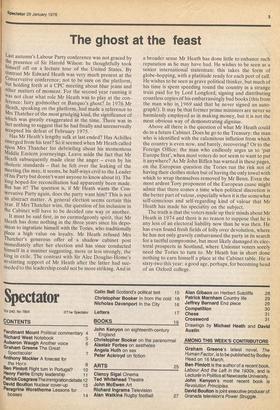The ghost at the feast
Last autumn's Labour Party conference was not graced by the presence of Sir Harold Wilson: he thoughtfully took himself off on a lecture tour of the United States. By contrast Mr Edward Heath was very much present at the Conservative conference; not to be sure on the platform, but holding forth at a CPC meeting about blue jeans and Other matters of moment. For the second year running it Was not clear what role Mr Heath was to play at the conference: fairy godmother or Banquo's ghost? In 1976 Mr Heath, speaking on the platform, had made a reference to Mrs Thatcher of the most grudging kind, the significance of Which was greatly exaggerated at the time. There was in fact nothing to suggest that he had finally and unreservedly accepted his defeat of February 1975.
Has Mr Heath's lengthy sulk at last ended? Has Achilles emerged from his tent? So it seemed when Mr Heath called Upon Mrs Thatcher for debriefing about his momentous Middle Eastern journeyings. Leave aside the fact that Mr Heath subsequently made clear the anger — even by his Choleric standards — that he felt over the leaking of the meeting (he may, it seems, be half-ways civil to the Leader Of his Party but doesn't want anyone to know about it). The long hoped-for reconciliation had apparently been made. Rut has it? The question is, if Mr Heath wants the Conservative Party again, does the party want him? This is not an abstract matter. A general election seems certain this Year. If Mrs Thatcher wins, the question of his inclusion in the Cabinet will have to be decided one way or another.
It must be said first, in no curmudgeonly spirit, that Mr Heath has done nothing in the three years since his deposition to ingratiate himself with the Tories, who traditionally Place a high value on loyalty. Mr Heath refused Mrs Thatcher's generous offer of a shadow cabinet post ninmediately after her election and has since conducted himself in a manner suggesting, more or less strongly, the king in exile. The contrast with Sir Alec Douglas-Home's unstinting support of Mr Heath after the latter had succeeded to the leadership could not be more striking. And in a broader sense Mr Heath has done little to enhance such reputation as he may have had. He wishes to be seen as a senior international statesman: this takes the form of globe-hopping, with a platitude ready for each port of call.
He wishes to be seen as grave political thinker, but much of his time is spent speeding round the country in a strange train paid for by Lord Longford, signing and distributing countless copies of his embarrassingly bad books (this from the man who in 1969 said that he never signed an auto graph!). It may be that former prime ministers are never so harmlessly employed as in making money, but it is not the most obvious way of demonstrating dignitas.
Above all there is the question of what Mr Heath could do in a future Cabinet. Does he go to the Treasury: the Man who is identified with the calamitous inflation from which the country is even now, and barely, recovering? Or to the Foreign Office: the man who endlessly urges us to 'put Europe first', when most voters do not seem to want to put it anywhere? As Mr John Biffen has warned in these pages, on the European question the Tories run the risk not of having their clothes stolen but of having the only towel with which to wrap themselves removed by Mr Benn. Even the most ardent Tory proponent of the European cause might admit that there comes a time when political discretion is the better part of valour, especially when it is the somewhat self-conscious and self-regarding kind of valour that Mr Heath has made his speciality on the subject.
The truth is that the voters made up their minds about Mr Heath in 1974 and there is no reason to suppose that he is any less of an electoral liability now than he was then. He has even found fresh fields of folly over devolution, where he has not only gravely embarrassed the party in its search for a tactful compromise, but most likely damaged its elec toral prospects in Scotland, where Unionist voters sorely need the Tories to turn to. Mr Heath has in short done nothing to earn himself a place at the Cabinet table. He is sixty-two this year: a good age, perhaps, for becoming head of an Oxford college.


































 Previous page
Previous page